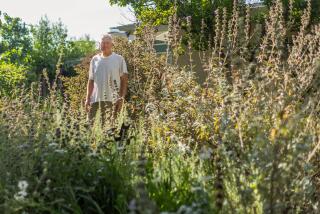Hank Brokaw dies at 82; key figure in California’s avocado industry
- Share via
Hank Brokaw, an avocado and citrus nurseryman who played a crucial role in the development of California’s avocado industry, died Wednesday at his home in Santa Paula. He was 82.
He had suffered several strokes over the last two years and had been in declining health, said his daughter Elena.
Since the early years of the California avocado industry in the 1920s, the most serious problem confronting growers was a fungal disease later identified as Phytophthora cinnamomi, commonly known as avocado root rot.
By the 1950s, scientists discovered a few individual seedlings that were tolerant to this disease and thus suited for use as rootstock, the bottom part of the tree on which the fruiting variety, such as Hass or Fuerte, would be grafted.
It was difficult, however, to multiply these disease-resistant seedlings for consistent rootstock because avocado seedlings did not grow true to type; all avocado groves at the time were grafted on seedling rootstock that varied considerably.
University of California scientists discovered a complex method, involving growing in the dark, to reproduce the disease-tolerant rootstock, but it was Brokaw who made this technique practical and commercialized it, starting in the 1970s.
At first, this relatively expensive method was controversial among growers, but it prevailed by the late 1980s, and today about 90% of avocado nursery trees newly planted in orchards are grafted on clonal rootstock, said Brokaw’s son Rob, who manages Brokaw Nursery in Saticoy, a small, unincorporated town in Ventura County.
Were it not for Hank Brokaw’s championing of this innovation, the state’s avocado industry probably would be smaller and less profitable today, said Mary Lu Arpaia, a University of California avocado researcher.
William Henley Brokaw, known as Hank, was born March 23, 1927, in Whittier, to Robert Lee Brokaw, an oil field worker who also ran a small nursery, and Helen White Brokaw.
His extended family included several prominent avocado nurserymen, notably ones who licensed the rights to the Hass variety and promoted it in its early years.
After serving in the Navy, Brokaw attended Fullerton Junior College but earned a bachelor’s degree in premedical studies at Harvard University and a master’s degree in anthropology at the University of Chicago, where he met his future wife, Ellen McGiffert.
Seemingly seeking to avoid the family business, he worked for a number of years as a high school teacher, but somehow felt compelled to plant 500 avocado seeds as a hobby, which led in 1956 to the establishment of his own nursery.
Brokaw sometimes enjoyed playing the unassuming farmer, but he was a shrewd businessman, and his nursery flourished, especially during the 1970s, when avocado plantings boomed.
For many years, it has been by far the state’s largest avocado nursery as well as the leading citrus nursery in Ventura County.
Brokaw also farmed 350 acres of his own groves, of citrus, avocados and a few exotic fruits such as cherimoyas and white sapotes.
But he did not consider profit to be his overriding goal, and he always was looking out for the interests of other farmers.
His nursery hosted the test plots of many avocado and citrus breeders and researchers.
Brokaw served twice as president of the California Avocado Society, in 1973-74 and 1986-87.
And despite his family’s links to the Hass variety, he lamented the emergence of a virtual Hass monoculture, advocating the merits of other varieties such as Pinkerton and Reed.
“He was the pillar of the avocado industry,” said Ben Faber, a Ventura County farm advisor.
In addition to his wife, his son Rob of Santa Paula and his daughter Elena Maria Brokaw of Ventura, he is survived by three other children, Debbie Jackson of Yachats, Ore.; Elisabeth Rossi of San Carlos, Calif.; and William Henley (known as Will) Brokaw Jr. of Watsonville, Calif., who sells fruit from family ranches at farmers markets in the San Francisco area; and nine grandchildren.
A memorial service will be held March 6 in Ventura.
Karp is a freelance writer.
More to Read
Start your day right
Sign up for Essential California for the L.A. Times biggest news, features and recommendations in your inbox six days a week.
You may occasionally receive promotional content from the Los Angeles Times.






